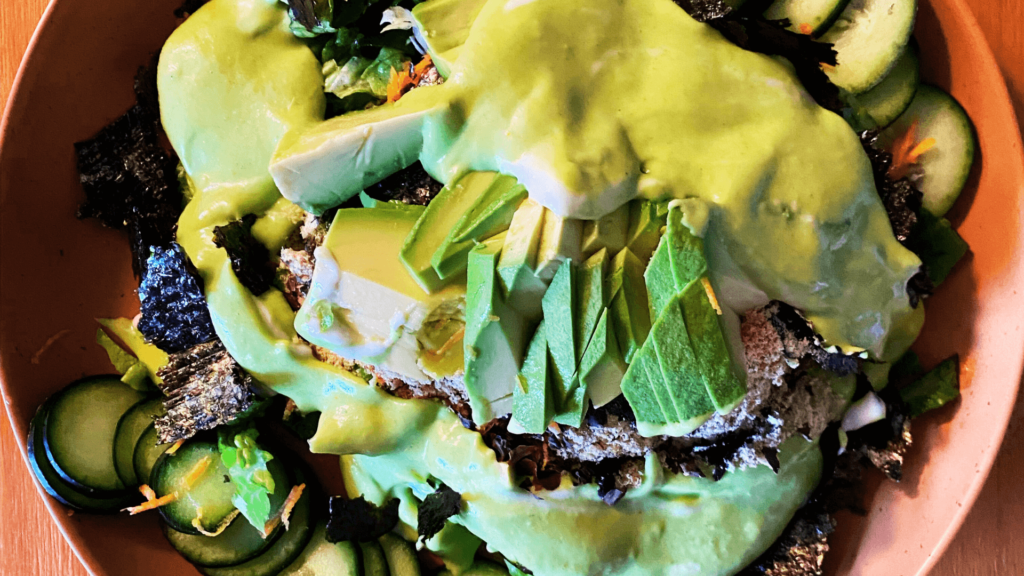Easy Low Oxalate Salad Dressing Recipe: Healthy & Homemade

If you are looking for a dairy free low oxalate salad dressing recipe and salad then you will love this recipe.
Whether you are looking to prevent kidney stones, have kidney stones, are dealing with interstitial cystitis, or have some other situation requiring a low-oxalate diet, this low-oxalate salad dressing recipe is for you.
With fresh young coconut meat as the base, it is fulfilling, healing, soothing, and satisfying.
The other thing I love is the addition of low-oxalate sea vegetables. I add Dulse and Nori.
These nourish your vital endocrine system, which is essential for deep health.
Cucumbers are low in oxalates and support kidney cleansing. We use both the juice of cucumber for the dressing and slices of cucumber in the salad.
Carrots are loaded with vitamin A, essential for disease prevention, and support the eye’s retina.
Today, people sit at computers far more than ever, so we must be diligent about eye care.
Avocados add high-quality fat, and they are also nutrient-rich in glutathione, a vital anti-oxidant.
Let’s get into the low oxalate salad dressing reicpe.
Low Oxalate Salad Dressing Recipe
My low oxalate salad dressing recipe will hit the spot and keep you healthy and strong. With so many diet sensitivites remember to test foods before implementing into your diet if you are very sensitive.
Course Lunch
Cuisine healthy recipes
Servings 1 person
Equipment
- Vita mix blender
- Grater
Ingredients
- 1 package frozen organic coconut meat thawed typically 2 cups of coconut meat
- 1 bunch fresh organic basil
- 1 tbsp apple cider vinegar
- 1 tsp sea salt or too taste
- 2 tbsp nutritional yeast
- 1 tbsp ground flax seeds
- 1-3 tbsp cucumber juice or purified water just until dressing blends, cucumber juice wil l give it more flavor
- 1 tbsp dulse flakes
- 1-2 sheets nori
- 1 small ripe avocado
- 1/4 small cucumber sliced
- 1 small carrot grated
Instructions
- For the low oxalate salad dressing recipe start by adding the clean coconut meat to the blender.
- Add in the nutritional yeast, apple cider vinegar, basil and sea salt.
- Turn on the blender and start slowly adding the cucumber juice or water until it catches and easily blends into a thick creamy dressing.
- For the low oxalate salad chop up 5 clean romaine leaves.
- Dice up your avocado and add to the top.
- Sprinkle with additional nutritional yeast and ground flax.
- Add grated carrots, sliced cucumbers.
- Sprinkle with dulse flakes and break up the nori sheets.
- Pour dressing over the top.
Notes
A low oxalate salad and a low oxalate salad dressing recipe can be a great way to eat healthy when dealing with kidney stones, kidney stone prevention, or conditions such as interstitial cystitis.
You can also make certain upgrades to this salad like a soft A/2 goat cheese topping and adding probiotics to your coconut meat dressing.
Keyword low oxalate recipes, low oxalate salad, low oxalate salad dressing recipe
Tried this recipe?Let us know how it was!
Low Oxalate Diet Benefits
As a nutritionist, I often recommend a low-oxalate diet to clients with specific health issues related to oxalate accumulation.
Oxalates are natural compounds found in many foods, and managing their intake can be beneficial for various reasons. Here are some benefits I have seen.
1. Prevention of Kidney Stones: A significant benefit of reducing oxalate intake is the prevention of kidney stones, especially calcium oxalate stones.
Oxalates can combine with calcium in the urine, forming stones.
By decreasing oxalate in your diet, you can reduce the risk of these stones developing.
2. Reduction in Kidney Stone Recurrence: You know the pain is real for those who have experienced kidney stones; minimizing oxalate consumption and working on gut health is important to heal.
3. Management of Primary Hyperoxaluria: A low oxalate diet is crucial in cases of primary hyperoxaluria—a rare genetic disorder that results in excessive oxalate production by the liver. It helps manage and reduce the body’s oxalate levels, aiding in symptom control. Also taking time to cleanse and support the liver can be beneficial to get to root causation.
4. Potential Relief for Vulvodynia: Research suggests that a low-oxalate diet could alleviate symptoms of vulvodynia, a chronic pain condition affecting the vulvar area. The thought is that oxalates may irritate sensitive skin and mucous membranes, although further studies are needed to understand this relationship fully. Focus on marshmallow root, slippery elm and cornsilk herbal teas can be beneficial here.
5. Improved Gut Health: High levels of oxalate in the diet may lead to the formation of crystals in the gastrointestinal tract, which can cause irritation and discomfort. Reducing dietary oxalate can help alleviate these digestive issues for some individuals but deeper down we must repair the gut with a whole lifestyle approach.
6. Support for People with Oxalate Sensitivity: Although oxalate sensitivity is not widely recognized, some people report symptoms such as joint pain, urinary tract discomfort, and other health issues linked to high oxalate intake. A low oxalate diet can be beneficial in managing and reducing these symptoms.
7. Interstitial Cystitis: Although this is not confirmed by medical research I have noticed many people with this condition benefit from a low oxalate diet.
Low Oxalate Salad Dressing Recipe Recap
There are many variations to a low oxalate salad dressing recipe.
I love using coconut meat as it is creamy and works fabulous as a non inflammatory base.
You could add whatever herbs agree with you. This creamy base can also work so great as a desert.
You can add your sweetener of choice for a creamy homemade yogurt.
If you are looking for more healthy recipes to incorporate into your lifestyle you may enjoy my Renegade Recipe Course here.
POPULAR POSTS







